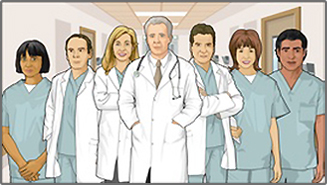Benefits of breastfeeding
Experts say that breastfeeding your baby is good for you and your baby. If you breastfeed for any length of time, no matter how short it is, you and your baby will benefit from breastfeeding.
Learn about breastfeeding your baby and decide if breastfeeding is for you. Know that breastfeeding takes time and practice. Get help from your family, nurses, lactation consultants, or support groups to succeed at breastfeeding.
Breastfeeding is Good for Your Baby
Breast milk is the natural food source for infants younger than 1 year. Breast milk:
- Has the right amounts of carbohydrate, protein, and fat
- Provides the digestive proteins, minerals, vitamins, and hormones infants need
- Has antibodies that help keep your baby from getting sick
Your Breastfed Baby is Less Likely to get Sick
Your breastfed baby will have fewer:
- Allergies
- Ear infections
- Gas, diarrhea, and constipation
- Skin diseases (such as eczema)
- Stomach or intestinal infections
- Wheezing problems
- Respiratory diseases, such as pneumonia and bronchiolitis
Your breastfed baby may have a lower risk for developing:
- Diabetes
- Obesity or weight problems
- Sudden infant death syndrome (SIDS)
Sudden infant death syndrome
Sudden infant death syndrome (SIDS) is the unexpected, sudden death of a child under age 1. An autopsy does not show an explainable cause of death....
Read Article Now Book Mark Article - Tooth decay
Breastfeeding is Good for you too
You will:
- Form a unique bond between yourself and your baby
- Find it easier to lose weight
- Delay starting your menstrual periods
- Lower your risk for diseases, such as type 2 diabetes, breast and certain ovarian cancers, osteoporosis, heart disease, and obesity
Breastfeeding can Save you Time and Money
You can:
- Save about $1,000 per year when you do not buy formula
- Avoid bottle cleaning
- Avoid having to prepare formula (breast milk is always available at the right temperature)
Get Help if Your Baby or you Have Special Needs
Know that most babies, even premature babies, can breastfeed. If needed, talk to a lactation consultant for help with breastfeeding.
Some babies may have trouble breastfeeding because of:
- Birth defects of the mouth (cleft lip or cleft palate)
- Problems with sucking
- Digestive problems
- Premature birth
- Small size
- Weak physical condition
You may have trouble breastfeeding if you have:
- Breast cancer or other cancer
- Breast infection or breast abscess
- Poor milk supply (uncommon)
- Previous breast surgery or radiation treatment
Breastfeeding is not recommended for mothers who have:
- Active herpes sores on the breast
- Active, untreated tuberculosis
- Human immunodeficiency virus (HIV) infection or AIDS
- Inflammation of the kidney
- Serious illnesses (such as heart disease or cancer)
- Severe malnutrition
Reviewed By
LaQuita Martinez, MD, Department of Obstetrics and Gynecology, Emory Johns Creek Hospital, Alpharetta, GA. Also reviewed by David C. Dugdale, MD, Medical Director, Brenda Conaway, Editorial Director, and the A.D.A.M. Editorial team.
Gontasz MM, Keiser AM, Aucott SW. Care of the newborn. In: Gleason CA, Sawyer T, eds. Avery's Diseases of the Newborn. 11th ed. Philadelphia, PA: Elsevier; 2024:chap 16.
Louis-Jacques A, Lawrence RM, Lawrence RA. The breast and the physiology of lactation. In: Lockwood CJ, Copel JA, Dugoff L, et al, eds. Creasy and Resnik's Maternal-Fetal Medicine: Principles and Practice. 9th ed. Philadelphia, PA: Elsevier; 2023:chap 11.
Newton ER. Lactation and breastfeeding. In: Landon MB, Galan HL, Jauniaux ERM, et al, eds. Gabbe's Obstetrics: Normal and Problem Pregnancies. 8th ed. Philadelphia, PA: Elsevier; 2021:chap 25.
US Department of Health & Human Services website. Office on Women's Health. Breastfeeding: pumping and storing breastmilk. www.womenshealth.gov/breastfeeding/pumping-and-storing-breastmilk. Updated February 22, 2021. Accessed November 21, 2024.


